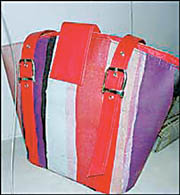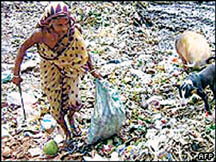|
dailynews |
|
|
|
|
|
OTHER LINKS |

|

|

|
Couple turn waste bags into fashion
PLASTIC BAGS: A couple in India have found a solution to the problem of plastic bags littering the streets of the country's capital, Delhi - by turning them into fashionable handbags. Anita and Shaleb Ahuja employ people in the slum areas of the city to collect the bags, which are a major problem throughout the country - often ending up polluting the environment, littering streets and blocking drains. The discarded bags are washed and sorted before being turned into plastic sheets, which are then refashioned into the handbags. "We were already into waste management, and we were getting a lot of plastic waste," Mrs Ahuja told BBC World Service's Outlook programme. "That's when we decided to try and find a solution to this big problem." Mrs Ahuja and her husband established a non-governmental organisation called Conserve to launch their idea, using their life savings to set it up. Plastic bags are such a problem in India that one state, Himachal Pradesh, has even banned them outright.
In Delhi, however, Conserve employs rag pickers to scour the city's waste dumps. Some women snip at the handles of the bags to make them into sheets; others wash them in water and detergent and hang them on a clothes line. These are then moulded together into single sheets of thick, durable plastic, and stitched into bright, colourful handbags. Mrs Ahuja said the idea came by accident, when a friend making fabric bags asked for a few sheets of the plastic, and designed the first bag. "I showed it to my friends, and they liked it very much," she said. "That was the time that it struck me that it had potential." It has now become a highly successful enterprise, employing 300 people and with a turnover of around $150,000. "Lots of women come to me and say they also want to work here," said Gita Pande, one of the Conserve workers. "I don't want to travel out of a slum to work I feel safe here, so I don't mind working here. "I'm also doing something that's useful. Polythene bags clog our drains. Cows eat them and get choked. By making them into bags, they get used, and unemployed people get jobs. "I feel it's good for the municipality as well, because we are taking the garbage off the streets, and they don't have to clean them." The Ahujas are now trying to convince the Indian Ministry of Culture to recognise what they are doing as a craft. However, Mr Ahuja explained that they are not having much success. "They say that if it's not 500 years old, it's not a craft," he said. "It is absolutely frustrating." BBC |





